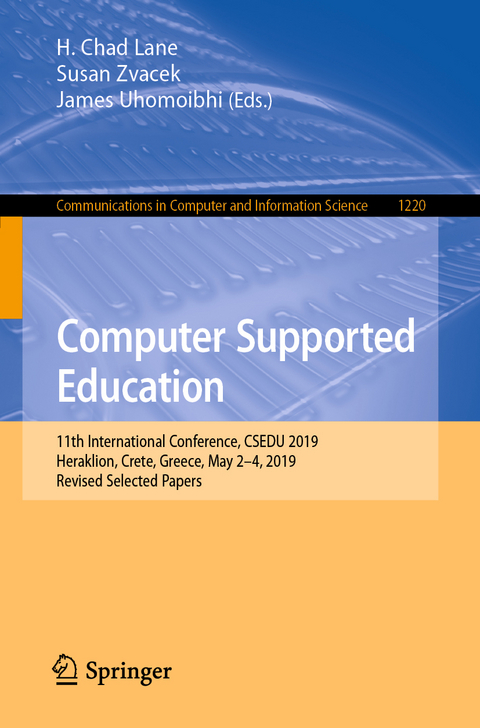
Computer Supported Education
Springer International Publishing (Verlag)
978-3-030-58458-0 (ISBN)
The 30 revised full papers were carefully reviewed and selected from 202 submissions. The papers cover wide research fields including authoring tools and content development, AV-communication and multimedia, classroom management, e-Learning hardware and software, blended learning, critical success factors in distance learning.
How Programming Students Trick and What JEdUnit Can Do against It.- Exploring the Affordances of SimReal for Learning Mathematics in Teacher Education: A Socio-cultural Perspective.- Why clicks and tool-time are not the best predictors: lessons from dispositional learning analytics.- Teaching Defence against the Dark Arts using Game-based Learning: A Review of Learning Games for Cybersecurity Education.- A Collective Dynamic Indicator for Discussion Forums in Learning Management Systems.- Immersion and Control in Learning Art Knowledge: An Example in Museum Visit.- Studying Relationships between Network Structure in Educational Forums and Students' Performance.- Emotion Recognition from Physiological Sensor Data to Support Self-regulated Learning .- Separating the Disciplinary, Application and Reasoning Dimensions of Learning: The Power of Technology-based Assessment.- Behind the Shoulders of BebrasTeams: Analyzing How They Interact with the Platform to Solve Tasks.- Computational Pedagogy: Block Programming as a General Learning Tool.- RefacTutor: An Interactive Tutoring System for Software Refactoring.- User-centered Design: An Effective Approach for Creating Online Educational Games for Seniors.- Population Growth Modelling Simulations: Do They Affect the Scientic Reasoning Abilities of Students?.- Novice Learner Experiences in Software Development: A Study of Freshman Undergraduates.- Promoting Active Participation in Large Programming Classes.- Agile Methods Make It To Non-vocational High Schools.- Testing the Testing Effect in Electrical Science with Learning Approach as a Factor.- A Web Platform to Foster and Assess Tonal Harmony Awareness.- MATE-BOOSTER: Design of Tasks for Automatic Formative Assessment to Boost Mathematical Competence .- Educational Practices in Computational Thinking:Assessment, Pedagogical Aspects, Limits, and Possibilities: A Systematic Mapping Study .- Virtual Reality and Virtual Lab-based Technology-Enhanced Learning in Primary School Physics.- Increasing Parental Involvement in Computer Science Education through the Design and Development of Family Creative Computing Workshops.- Retention of University Teachers and Doctoral Students in UNIPS Pedagogical Online Courses.- Designing Culturally Inclusive MOOCs.- Evaluation of an Interactive Personalised Virtual Lab in Secondary Schools.- Potential Benets of Playing Location-based Games: An Analysis of Game Mechanics.- Resolving Efficiency Bottleneck of the Bellman Equation in Adaptive Teaching.- Ontology-based Analysis and Design of Educational Games for Software Refactoring.- in-Game Raw Data Collection & Visualization in the Context of the ThimelEdu Educational Game.
| Erscheinungsdatum | 11.11.2020 |
|---|---|
| Reihe/Serie | Communications in Computer and Information Science |
| Zusatzinfo | XVII, 648 p. 302 illus., 179 illus. in color. |
| Verlagsort | Cham |
| Sprache | englisch |
| Maße | 155 x 235 mm |
| Gewicht | 1009 g |
| Themenwelt | Schulbuch / Wörterbuch ► Unterrichtsvorbereitung ► Unterrichts-Handreichungen |
| Mathematik / Informatik ► Informatik | |
| Schlagworte | Applications • Artificial Intelligence • Computer aided instruction • Computer Science • conference proceedings • Curricula • Education • E-Learning • Human-Computer Interaction (HCI) • Informatics • learning • Learning Environments • Research • Software engineering • User Interfaces |
| ISBN-10 | 3-030-58458-5 / 3030584585 |
| ISBN-13 | 978-3-030-58458-0 / 9783030584580 |
| Zustand | Neuware |
| Haben Sie eine Frage zum Produkt? |
aus dem Bereich


